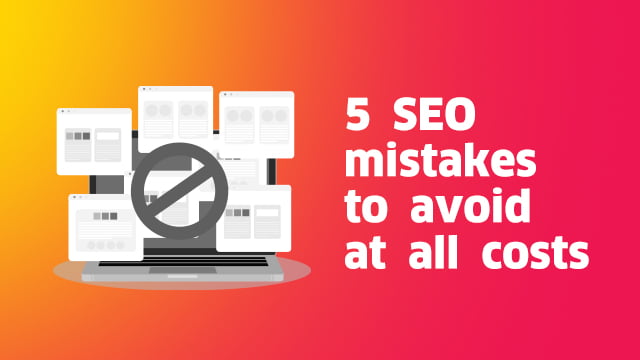5 SEO mistakes to avoid at all costs
SEO, or search engine optimization, is the process of improving the visibility and ranking of a website in search engine results pages (SERPs). While SEO can be complex and time-consuming, it is an essential aspect of any online business or marketing strategy. However, it is easy to make mistakes that can have a negative impact on your SEO efforts. Here are five common SEO mistakes to avoid:
Keyword stuffing
In the past, it was common to stuff as many keywords as possible into website content in an attempt to improve ranking. However, search engines have become much more sophisticated and can now detect when keywords are being used unnaturally. Keyword stuffing can actually hurt your ranking and lead to a penalty from search engines. Instead of focusing on keyword density, focus on creating high-quality, relevant content that naturally includes your target keywords.
- One way to ensure that your keyword usage is natural is to vary the words and phrases you use to describe your products or services. For example, instead of using the same exact phrase over and over again, try using synonyms or related terms. You can also use latent semantic indexing (LSI) keywords, which are terms that are related to your main keyword and help search engines understand the context of your content.
- Another tip is to use your target keywords in a way that makes sense for the user. Rather than cramming them into your content in a way that feels forced or awkward, try to incorporate them naturally into your headlines, subheadings, and body text. This will not only make your content more readable for users, but it will also signal to search engines that your website is providing valuable information on the topic.
Related: 4 Ways you can get ranked high through keywords
Ignoring mobile optimization
- With the increasing number of users accessing the internet from mobile devices, it is more important than ever to ensure that your website is mobile-friendly. Google has even begun using mobile-first indexing, meaning that the mobile version of your website is used to determine its ranking in search results. If your website is not optimized for mobile devices, it could be penalized in search results and you could potentially lose a significant amount of traffic.
- To make sure your website is mobile-friendly, you should ensure that it is responsive and adjusts to fit the screen size of different devices. This means that your website should look and function just as well on a smartphone as it does on a desktop computer. In addition to making your website responsive, you should also optimize the loading speed of your pages. Slow loading times can be frustrating for users and can lead to a high bounce rate, which can negatively impact your ranking.
Related:5 Ways to Make Your Website Easier to Navigate
Not using header tags
- Header tags, or H1, H2, etc. tags, are used to structure the content on your website and make it easier for search engines to understand the hierarchy of your content. Using header tags appropriately can help improve your ranking and make your website more user-friendly.
- The H1 tag is usually used for the main headline of a page and should be used sparingly, as it carries the most weight in terms of SEO. The H2, H3, and other header tags should be used to structure the content and give it a clear hierarchy. This makes it easier for users to scan and understand the content of your page, and it also helps search engines understand the main points and subpoints of your content.
- In addition to using header tags appropriately, you should also include your target keywords in your headlines and subheadings. This helps search engines understand the topic of your content and can improve your ranking for those keywords.
Related: 5 Proven SEO Tips to Drive Traffic to Your Website
Using hidden or irrelevant links
- Hidden links are links that are not visible to users, either because they are hidden in the code of the website or because they are the same color as the background. These types of links are often used to try and manipulate search engine rankings by fooling the algorithm into thinking that a website has more links than it actually does.
- Not only is this practice unethical, but it is also easily detectable by search engines and can result in a penalty. In fact, Google has a specific algorithm dedicated to identifying and penalizing websites that use hidden links.
- In addition to avoiding hidden links, it is also important to make sure that the links you do include are relevant and high-quality. Links from spammy or low-quality websites can actually hurt your ranking, as they can signal to search engines that your website is not trustworthy. Instead, focus on building links from reputable and relevant websites in your industry.
- Including links that are relevant to your content is also important for the user experience. If a user clicks on a link that is not relevant to the topic of the page, they will likely be disappointed and may leave your website. This can increase your bounce rate and negatively impact your ranking.
- To avoid using hidden or irrelevant links, make sure to only include links that are relevant to your content and that are visible to users. This will help improve the user experience and protect your website from potential penalties.\
Not using alt tags on images
- Alt tags, or alternative text, are used to describe the content of an image and are important for SEO as they allow search engines to understand the content of your website. Using appropriate alt tags can help improve your ranking and make your website more accessible to users who are using screen readers.
- Alt tags should be descriptive and include your target keywords when appropriate. However, it is important not to stuff alt tags with keywords, as this can be seen as spammy and can actually hurt your ranking. Instead, focus on describing the content of the image in a way that is both informative and relevant.
- In addition to improving your SEO, using alt tags can also make your website more accessible to users with disabilities. Screen readers, which are used by people with visual impairments, rely on alt tags to understand the content of images. By including appropriate alt tags, you can ensure that your website is accessible to a wider audience.
Related: Know How On-page SEO can help your business!
Conclusion
Avoiding these common SEO mistakes can help improve the ranking and visibility of your website in search results and drive more traffic to your site. By focusing on creating high-quality, relevant content, optimizing your website for mobile devices, using header tags appropriately, building high-quality and relevant links, and using alt tags on images, you can set your website up for success in the search rankings.
The Bumblebee Branding Company is an award winning company that specialises in Branding, Digital Marketing & Video Production in Chennai.
Skip the trial-and-error, and don’t worry about figuring anything out. We’re here for you to grow your business through digital marketing funnels, customer touch points, and customer acquisition.








